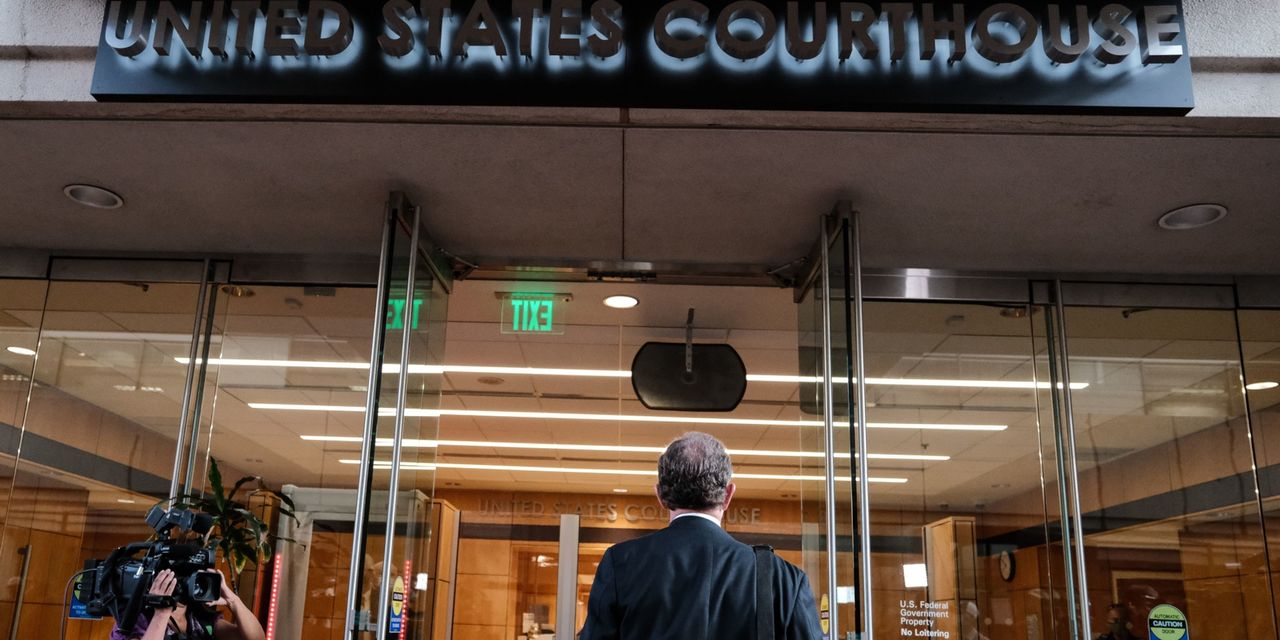
SAN JOSE, Calif.— A former scientist for Pfizer Inc. PFE 0.70% testified in federal court Friday that he had advised his employer against working with Theranos Inc. more than a year before the startup altered a report so it featured Pfizer’s logo and purported to validate Theranos’s blood-testing devices.
The testimony by Shane Weber in the criminal fraud trial of Theranos founder Elizabeth Holmes directly supports claims by government prosecutors that Ms. Holmes had forged the document to show it to investors and persuade them that Theranos had been checked out and approved by Pfizer.
Dr. Weber described Friday the due diligence he went through in 2008 to assess Theranos’s technology and determine whether his company would have any use for it, including reviewing findings from a Theranos study involving cancer patients. Dr. Weber eventually decided that Pfizer shouldn’t get into business with Theranos and raised questions about the accuracy of its claims.
As part of his vetting process, Dr. Weber reviewed a document from Theranos that presented findings from a 15-month study beginning in 2007 which measured how 27 late-stage cancer patients responded to treatment. The Theranos devices were provided to patients to use at home, and their data was shared through the internet, with a cellphone or by landline phone, the document shows.
The findings showed huge variations between the subjects in the study, but Theranos failed to adequately explain why there was this variation, Dr. Weber testified. He conferred with colleagues who led oncology studies for Pfizer, and they told him they had no interest in using Theranos’s technology, Dr. Weber said. He had other concerns, which he later laid out in a seven-page report he shared internally at Pfizer: The startup made unconvincing arguments about its accomplishments, and the nine conclusions in Theranos’s cancer study report were “not believable.”
For instance, one of Theranos’s conclusions in its study is that “the Theranos System performed with superior performance.” Dr. Weber testified in court that he didn’t agree with that.
More than a year after Pfizer passed on a collaboration with Theranos, Ms. Holmes in April 2010 emailed Walgreens Boots Alliance Inc. executives a nearly identical copy of that cancer-patient study that Dr. Weber had reviewed. Theranos struck a partnership with Walgreens in 2013 to put its blood-testing devices in drugstores.
In this instance, according to the email that was displayed in court, Ms. Holmes claimed the report was an independent due diligence report on Theranos technology. The study had an important difference from the version Dr. Weber reviewed: the image of the Pfizer logo at the top of each page.
Dr. Weber said Friday the logo was added without Pfizer’s permission. He said before prosecutors showed him the document, he hadn’t been aware of its existence.
After Dr. Weber told Ms. Holmes in January 2009 that Pfizer wouldn’t be using its machines, Ms. Holmes “asked for other names at Pfizer to approach and I politely deflected,” according to an email he sent to his superiors that was displayed in court. Dr. Weber also said his supervisors had agreed with his decision to pass on Theranos.
Jurors also heard testimony for the first time Friday from an investor underpinning one of the wire fraud charges against Ms. Holmes. Ms. Holmes faces a dozen counts of wire fraud and conspiracy to commit wire fraud, with the charges relating to both investors and patients who had received blood test results from Theranos.
Ms. Holmes’s lawyers have argued that her only crime is running a failed startup and that she lost everything when Theranos shut down in 2018. They say she relied on her top deputy for accurate information about the company’s finances and operations, and never knowingly misled anyone.
Bryan Tolbert, vice president of finance for Dallas-based Hall Group, took the witness stand Friday to discuss his firm’s two investments in Theranos. Hall Group, founded by commercial real-estate developer Craig Hall, primarily invests in real estate and provides construction loans, but it has done a small amount of startup investing.
Mr. Tolbert testified that his firm invested in Theranos indirectly through a separate venture-capital fund, Southern California-based Black Diamond Ventures, in 2006. Hall Group later made a direct investment in Theranos in 2013, a $4.9 million bet that is listed in the government’s indictment against Ms. Holmes.
Prosecutors displayed documents that showed financial projections that Theranos shared with Mr. Tolbert’s firm and other investors involved in the 2006 funding round that valued Theranos at $125 million.
Mr. Tolbert testified that, in 2006, his understanding was “there was at this time a functioning product.”
According to the documents, investors were told they should expect Theranos to have an initial public offering in the first quarter of 2008 with a valuation of about $1 billion. Theranos also told investors it would become profitable in the fourth quarter of 2007 owing to new contracts for $30 million to $50 million of revenue.
Projections showed Theranos’s revenue jumping from zero in 2006, when Hall Group first invested, to $4.6 million the following year and $67 million by the end of 2008. Its losses would improve to a $12 million gain at the end of 2008, Theranos told investors.
Those projections convinced Mr. Tolbert that the Hall Group investment would provide a healthy return. “That’s why these are important numbers to look at,” he testified.
Theranos would never have a public offering or turn a profit.
Write to Heather Somerville at [email protected]
Corrections & Amplifications
Theranos’s losses would improve to a $12 million gain at the end of 2008, the company told investors. An earlier version of this article incorrectly said losses would improve to a $12 billion gain. (Corrected on Oct. 22)
Copyright ©2021 Dow Jones & Company, Inc. All Rights Reserved. 87990cbe856818d5eddac44c7b1cdeb8








